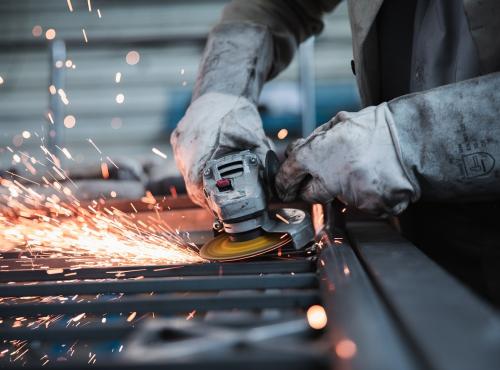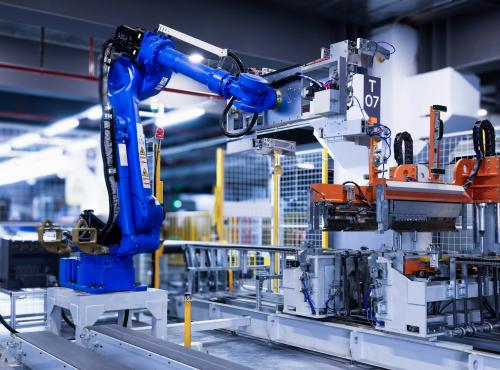Manufacturing Commission Roundtable: Resilience to External Shocks
The aim of this roundtable, held on 12th January 2021, was to gather evidence on the resilience of the manufacturing sector to external shocks. This will be used to inform the Manufacturing Commission’s forthcoming report, which aims to determine how sector can be more productive, resilient, and sustainable as it builds back better from the 2020 Coronavirus pandemic.
The session was kindly chaired by Lord Bilimoria of Chelsea (pictured), with contributions from commission vice-chairs, Jack Dromey MP and Mark Pawsey MP, along with members of the Manufacturing Commission and All Party Parliamentary Manufacturing Group.
Speaker: Professor Steve Evans
Professor Steve Evans is Director of Research in Industrial Sustainability at the Institute for Manufacturing at the University of Cambridge and also chairs the Manufacturing Policy Panel at the Institute for Engineering and Technology. Steve has over 20 years of academic experience, which includes working collaboratively with leading industrial and academic institutions from around the globe.
- Under current growth projections, many manufacturing businesses will be three times their current size by 2050. In order to do this sustainably, they must cut greenhouse gas emissions to zero and halve resource use.
- The Government’s Foresight report into the future of Manufacturing1 identified an ‘age of disruption’ where adaptation and resilience will become a key focus for many businesses. We are now entering this phase and it is unlikely that there will be an extended period of stability before the next major shock. It is essential that manufacturing businesses start to plan for future disruption at the earliest opportunity.
- If every manufacturing business matched the most efficient operator in its own sector, companies, on average, would be 24% more profitable, would generate 30% more jobs, and would report a 9% reduction in greenhouse gas emissions.
1 The future of manufacturing: A new era of opportunity and challenge for the UK, Government Office for Science, 2013
- Sustainability and resilience planning go hand-in-hand. Improving resource and energy efficiency leads to cost savings and helps to mitigate the impacts of unforeseen events. Profits can then be reinvested into longer term resilience planning.
- Manufacturing businesses should prioritise resource efficiency over labour efficiency. For example, a water efficient business can operate for longer, compared to its competitors during a period of drought. Climate change will increase the frequency of extreme weather events such as drought and flooding.
- During times of normal operation, the most resilient businesses are continuously running experiments, learning from them, and crisis planning. This allows them to adapt quickly under periods of disruption.
- Businesses should strive to achieve wellbeing as part of their post-crisis business planning, i.e. understanding what makes their customers’, staff, investors’, and suppliers’ lives better, rather than purely trying to achieve growth. Once this has been achieved and is demonstrated to be profitable, then operations can be scaled.
- Looking to the future, trust between firms will become far more important than it is now. The High Value Manufacturing Catapult’s Ventilator Challenge was a good example of how trust and collaboration can yield results during times of disruption.
Discussion
- Effective resilience planning includes several important elements including information flow to allow informed decision-making, robustness - especially in supply chains, and an ability to adapt and learn from mistakes. Planning these elements on medium to long-term timescales is essential.
- Digitisation will be crucial to recovery and the Levelling Up agenda. Government must re-commit to supporting 100% coverage of fibre infrastructure, on which roll-out of the 5G network will depend. Ofcom also can play a role in incentivising deployment of fibre infrastructure across the country.
- A strong manufacturing sector is key to the success of our economy and its sustainability. We currently have a once-in-a lifetime opportunity create a system that is new and better than the old one. The sector needs Government support to ensure that jobs and skills are not lost, in particular those that will be required to deliver on the UK’s net-zero target. Even under normal circumstances the UK’s aerospace and automotive sectors do not compare to its international competitors in terms of Government investment. This will be essential for growth, especially if we are to scale new sustainable technology, such as fibre infrastructure and batteries for electric vehicle roll-out.
- The public procurement process should be modernised so it is accessible to SMEs rather than just large companies. In turn, SME’s must be better in investing in new technology, rather than ‘sweating’ existing assets.
- The current size of the UK’s manufacturing sector (around 10%) underestimates its importance and the role it has in the country’s recovery from the pandemic. We must push the new image of manufacturing, i.e. growth in tech, creative industries, and healthcare, in order to be appealing to finance providers.
- Ensuring a diverse workforce can help to build resilience. Women and BAME individuals are underrepresented in manufacturing and evidence2 shows that boards with racial and ethnic diversity perform better.
- Evidence from industry shows that the companies that were proactive and took early action have proved most resilient throughout the pandemic. Successful businesses consulted with their workforce and included staff in business planning and new ways of working.
- As businesses pivot and review current working practices, there is an opportunity for many ‘shop floor’ operations to be be done remotely using wearable and ‘no-touch’ technologies.



